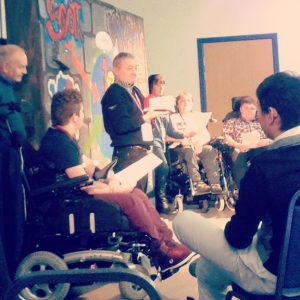Expression Where It Counts

Includem were invited to present at ARC Scotland’s Expression Where It Counts forum on transitions, held at Touchbase Scotland in Glasgow, on November 28th. The day was an exploration of transitions in Scotland, for young people with additional support needs. Other presentations came from organisations such as National Deaf Children’s Society, Scottish Spina Bifida Association and Sense Scotland. Includem’s Transitional Support Service sat in an interesting place within this; whilst the young people that Includem work with wont necessarily have additional support needs, they may have continuing vulnerabilities due to past histories of abuse, neglect, trauma, offending and deprivation and on-going deficits in family and social supports at a critical time in their adolescent development. Whilst Includem’s Transitional Support Service has a focus on transitioning young people from statutory child services, to adult life, the additional support needs discussed by other organisations generally led to their young people to be looking for smooth transitions between child services – in education, health etc – to adult services, as many of these young people will continue to need support into their adult lives.
Includem were invited to present at ARC Scotland’s Expression Where It Counts forum on transitions, held at Touchbase Scotland in Glasgow, on November 28th. The day was an exploration of transitions in Scotland, for young people with additional support needs. Other presentations came from organisations such as National Deaf Children’s Society, Scottish Spina Bifida Association and Sense Scotland. Includem’s Transitional Support Service sat in an interesting place within this; whilst the young people that Includem work with wont necessarily have additional support needs, they may have continuing vulnerabilities due to past histories of abuse, neglect, trauma, offending and deprivation and on-going deficits in family and social supports at a critical time in their adolescent development. Whilst Includem’s Transitional Support Service has a focus on transitioning young people from statutory child services, to adult life, the additional support needs discussed by other organisations generally led to their young people to be looking for smooth transitions between child services – in education, health etc – to adult services, as many of these young people will continue to need support into their adult lives.
There was discussion throughout the day on Scottish Transitions Forum’s 7 principles of good transition. These are:
1. All plans and assessments should be made in a person-centred way
2. Support should be co-ordinated across all services
3. Planning should start early and continue up to age 25
4. Young people should get the support they need
5. Young people, parents and carers must have access to the information they need
6. Families and carers need support
7. Legislation and policy should be co-ordinated and simplified.
We presented Transitional Support Service, and the Now Including project, as a good example of many of these – particularly number one. A key aspect to TSS is that young people take the lead in their own support plans; identifying which areas they need support in, in discussion with their workers.

(Apologies for the sub-standard photos. My Samsung just ain’t no iPhone.)
We heard from several young people over the course of the day. A group from Arthritis Care Scotland performed a play they had written themselves, about Erin, a girl who lives with arthritis and is due to transition from children’s healthcare to adult healthcare services. Throughout the performance our protagonist collected all of the emotions she felt in a clear bin bag. They portrayed a bad transition, during which the principles outlined above were not met and Erin’s bag filled with red, negative emotions: ignored, disengaged, and frightened. In the second act, they introduced their proposal for a “Transitions Nurse” – a nurse who would work with her for a period of time before and after her switch to adult services. Included and supported, her bag quickly filled with green, positive emotions. Service designers in training!


The group from Children’s Hospice Association Scotland (CHAS) had built a wall (from polystyrene) and graffitied their names and other images on it. They asked members of the audience to come up and open drawers in the wall – each containing an object which represented one part of their transition, and what they felt should be considered. It was powerful stuff, with each member of the team giving us a story from their own transition. One young woman, Kelly, felt too shy to speak in front of everyone, and so read her story from behind the wall. She told us about her trip to see her favourite band, One Direction, in concert. The trip was going really well until she tried to use the electric hoist in the stadium’s changing facilities, which had been provided for her. It hadn’t been charged. In the end, she only made it to see the last half hour of the concert and she felt her night had been ruined – she used this example to demonstrate how important it is for different agencies to link up. “I love One Direction, but I would also love one good plan,” she finished. As the team summed up at the end, all of a sudden Kelly burst through the polystyrene wall! A nice metaphor about breaking down barriers and overcoming hurdles – although my heart was going at a million miles for quite some time afterwards.


Muriel Gray, speaking as key note speaker and the mother of a young person with additional support needs, told her audience that as parents, she and those like her, would “fight Goliath” to give her daughter the best life she could. We heard from several other passionate and supportive parents, speaking on behalf of their young people where they were unable to. As “corporate parents”, who build genuine personal relationships with young people, the workers of Includem are the Goliath-fighting-Davids for young people who don’t find this sort of support elsewhere.
Follow the Now Including project.